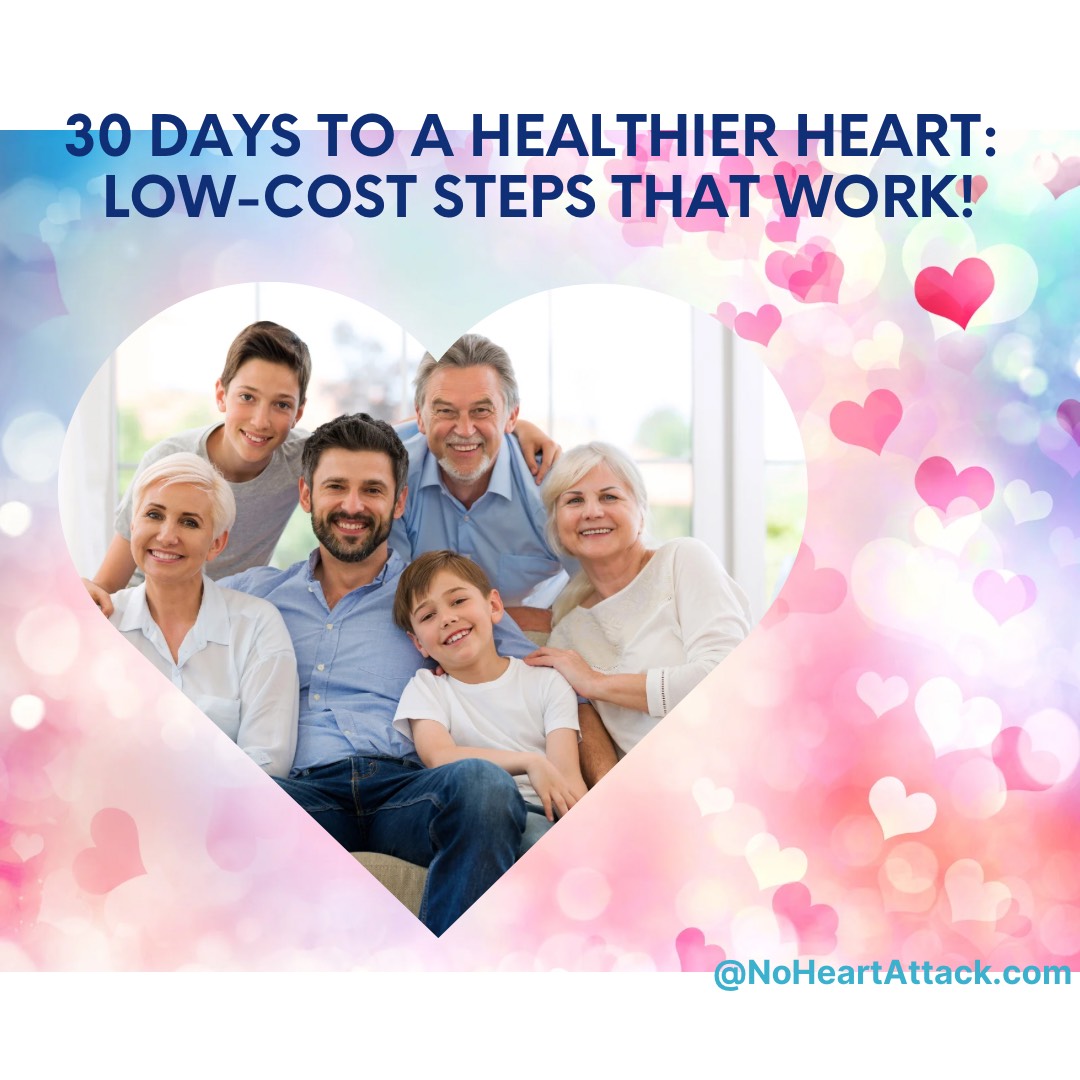
30-Day Heart Health Plan - Affordable and Effective Steps for a Healthier Heart
30 Days to a Healthier Heart: Low-Cost Steps That Work
Improving heart health doesn't have to be expensive or complicated. In fact, small, low-cost changes can make a big difference in your cardiovascular well-being. Whether you're looking to prevent heart disease or simply want to improve your overall heart health, following a 30-day plan is one of the easiest and most effective ways to start.
In this blog, we'll outline a simple 30-day heart health plan that costs next to nothing and only requires small daily adjustments. By the end of the month, you'll likely notice significant improvements in your energy levels, mood, and, most importantly, your heart health. (Please pay close attention: If your situation is serious, call 911.)

Day 1-7: Start with Simple Movement
Goal: Increase daily activity levels with walking.
What to do:
• Walk for 30 minutes each day, whether it’s a brisk walk around your neighborhood or a scenic walk in the park.
• Walking is a low-cost, high-reward activity that improves circulation, reduces stress, and strengthens the heart.
Time Commitment: 30 minutes daily
Cost: Free!
Why it works:
Walking is one of the most accessible exercises and can help lower blood pressure and improve circulation. According to Dr. Michael Joyner, a cardiovascular researcher at the Mayo Clinic, “A simple walk is one of the best forms of exercise for maintaining heart health.”
Day 8-14: Incorporate a Heart-Healthy Diet
Goal: Focus on anti-inflammatory foods to reduce heart disease risk.
What to do:
• Add more whole foods like fruits, vegetables, whole grains, and healthy fats (e.g., olive oil, avocado) to your meals.
• Replace processed foods with healthier options, such as blueberries, avocados, salmon, and oats, all of which have anti-inflammatory properties that help support heart health.
Time Commitment:
Meal prep time varies (15-30 minutes daily)
Cost: $10-$20/week for additional healthy foods (depending on local grocery prices)
Why it works:
Studies show that anti-inflammatory diets can significantly improve heart health by reducing the risk of inflammation in the blood vessels. According to Dr. David Katz, a prominent nutrition expert, “What you eat can reduce your risk of heart disease more effectively than any medication.”
Day 15-21: Add Nutritional Supplements
Goal: Support heart health with scientifically-backed supplements.
What to do:
• Start incorporating heart-healthy supplements like omega-3 fatty acids(good), CoQ10, and magnesium into your daily routine.
• These supplements help improve cholesterol levels, support blood vessel function, and reduce the risk of heart disease.
Time Commitment: 1 minute daily to take supplements
Cost: Around $20 USD/day for quality heart health supplements from Healos™ Integrated Therapy System.
Why it works:
High-quality supplements can provide additional nutrients that may be missing from your diet. Research has shown that omega-3 fatty acids can reduce triglyceride levels and lower the risk of heart disease. CoQ10 is known to support energy production in heart cells, while magnesium can lower blood pressure.
Day 22-28: Manage Stress Effectively
Goal: Reduce the impact of stress on your heart health.
What to do:
• Dedicate at least 15 minutes daily to stress-relieving activities such as deep breathing, yoga, or meditation.
• Consider journaling or mindfulness practices to help manage your mental and emotional health.
Time Commitment: 15 minutes daily
Cost: Free, though some people may prefer guided apps or classes ($5-$20 for subscriptions)
Why it works:
Chronic stress can lead to increased heart disease risk by raising blood pressure and inflammation. Research published in the Journal of the American College of Cardiology confirms that: Stress management techniques like mindfulness meditation and yoga can help lower blood pressure and reduce heart disease risk.
Day 29-30: Assess and Reflect
Goal: Reflect on your progress and plan for long-term heart health.
What to do:
• At the end of the 30 days, assess your progress. Have you noticed any changes in your energy levels, mood, or overall health?
• Continue to track your daily habits to ensure long-term commitment to heart health.
Time Commitment: 15-30 minutes for assessment and planning
Cost: Free
Why it works:
Reflecting on your progress helps solidify the new habits and encourages you to continue making heart-healthy choices in the future. By reflecting, you're more likely to continue the changes that have led to improvements in your heart health.
Total Investment for 30 Days:
• Time Commitment: About 45-60 minutes per day for a comprehensive plan.
• Cost: Only the price of supplements and healthy foods, less than $20-$60 for the month.
Why This 30-Day Plan Works OK:
This plan isn’t just about cutting costs—it's about making real, effective changes that improve your heart health in a manageable, affordable way. By committing to just a few changes each day, you’ll be able to see and feel improvements in your heart health, without breaking the bank. (Please pay close attention: If your situation is serious, call 911 immediately.)
As Dr. Mehmet Oz famously said, “It's never too late to start taking care of your heart.” And with this affordable 30-day plan, you can start taking care of your heart today—without the high costs of medical treatments and prescriptions.
Conclusion: Start Today for a Healthier Heart
Improving your heart health doesn't have to be costly.
By following these low-cost steps for just 30 days, you'll be well on your way to a healthier heart and a brighter future. Make heart health a priority—start today with our Healos Integrated Therapy System for your safe, holistic and effectively heart recovery journey.
Sources:
•“The Impact of Walking on Heart Health,” Mayo Clinic, 2022.
• Katz, D. (2019). “The Heart of Nutrition: How Your Diet Affects Your Heart.” Nutrition Journal.
•“Supplements and Heart Health: What You Need to Know,” National Institute of Health, 2023.
Ready to Take Action?
Don't wait for tomorrow—start today with a 30-day heart health plan. Explore our affordable supplements and continue your heart health journey with Healos Integrated Therapy.
